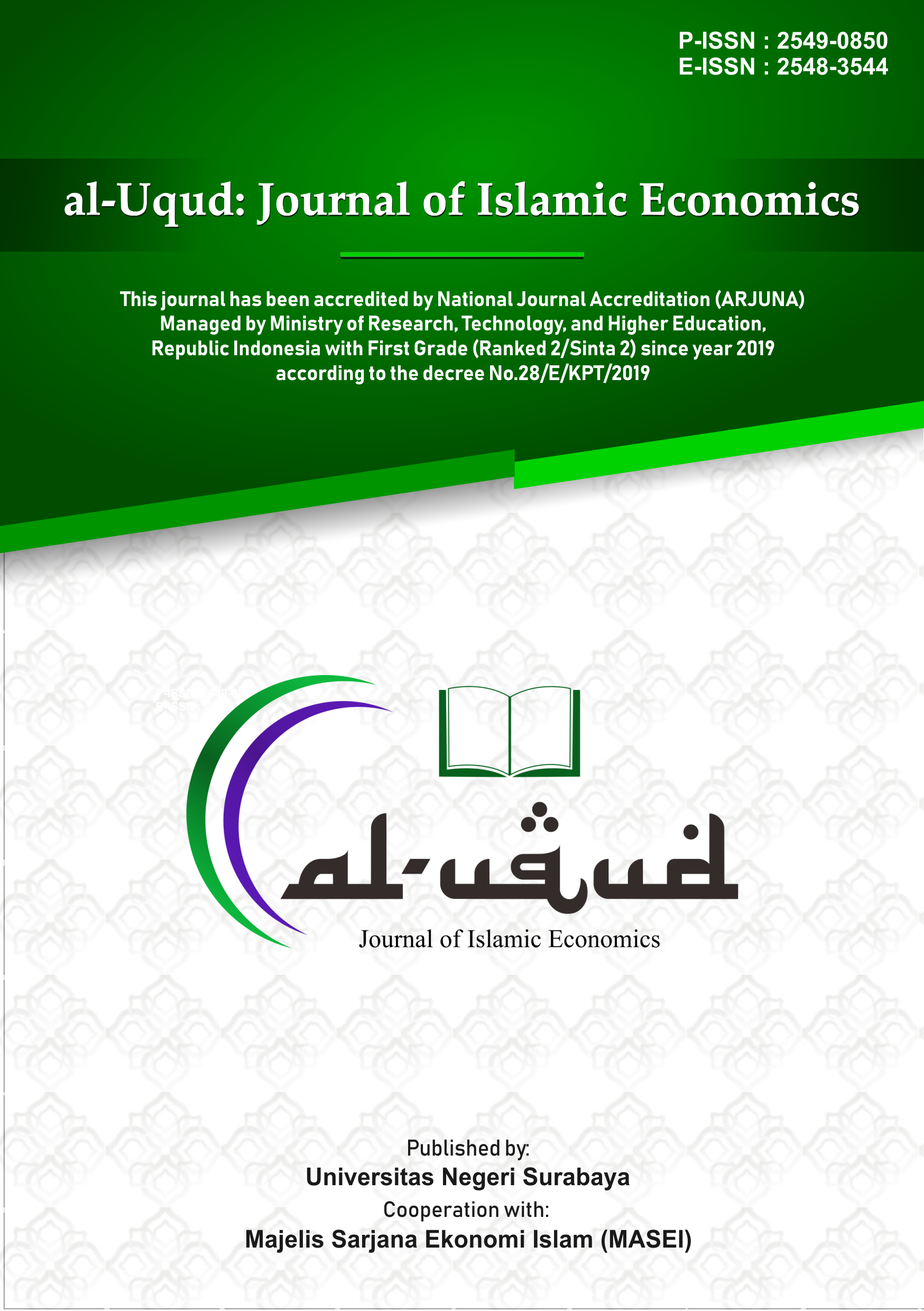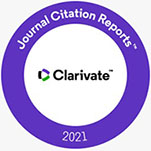Leveraging halal certification for gastronomy tourism strategy
DOI:
https://doi.org/10.26740/al-uqud.v9n1.p33-46Keywords:
Gastronomy, Halal Certification, MSMES ProductAbstract
Gastronomy tourism is one of the fastest-growing sectors in the global travel industry, introducing Muslim tourists to local cuisine prepared with halal ingredients. This study employs a grounded research method—the first and only one to explore the implementation of halal certification—and then applies a SWOT analysis to determine the most effective strategies for supporting halal gastronomy tourism. The findings indicate that the Halal Certification for Original MSME Products in Kediri City (PUSAKA) benefits from strong government support, business owner awareness, and the availability of facilitators to assist with the certification process. However, challenges include limited free certification quotas, administrative constraints, and insufficient capital. Opportunities arise from the growth of halal tourism, national support, and increasing demand for halal products. Meanwhile, threats stem from competition with other regions, potential certification costs in the future, and the risk of inconsistent product quality. To address these challenges, recommended strategies include administrative support, collaborative promotion, and a focus on product quality. The government's approach involves offering free halal certification programs and awareness campaigns to enhance MSMEs' preparedness. Additionally, facilitators provide administrative and technical guidance, while collaboration efforts promote halal-certified products in both domestic and international tourist markets. MSMEs are also encouraged to maintain the quality and consistency of their halal-certified products.
References
Ab Talib, M. S., Md. Sawari, S. S., Abdul Hamid, A. B., & Ai Chin, T. (2016). Emerging Halal food market: an Institutional Theory of Halal certificate implementation. Management Research Review, 39(9), 987–997.
Afroniyati, L. (2014). Analisis ekonomi politik sertifikasi halal oleh Majelis Ulama Indonesia. JKAP (Jurnal Kebijakan Dan Administrasi Publik), 18(1), 37–52.
Agus, P. A. (2017). Kedudukan Sertifikasi Halal Dalam Sistem Hukum Nasional Sebagai Upaya Perlindungan Konsumen Dalam Hukum Islam. Amwaluna: Jurnal Ekonomi Dan Keuangan Syariah, 1(1), 150–165. https://doi.org/10.29313/amwaluna.v1i1.2172
Ayu, I. G., & Budiasih, N. (2013). Metode Grounded Theory Dalam Riset Kualitatif. Jurnal Ilmiah Akuntansi Dan Bisnis, 9(1), 19–27.
BPJPH. (2023). Terakreditasi ISO/IEC 17025: 2017, Laboratorium Halal BPJPH Diakui Internasional.
BPS Kota Kediri, K. K. (2019). Jumlah Penduduk Menurut Kecamatan dan Agama (Jiwa), 2016-2018.
Caria, N., & Nuraeni, R. (2019). Developing Strategy of Chinatown as a Halal Gastronomic Tourism Destination in Bandung. 259(Isot 2018), 42–46. https://doi.org/10.2991/isot-18.2019.9
Charmaz, K. (2014). Constructing grounded theory.
De Jong, A., Palladino, M., Puig, R. G., Romeo, G., Fava, N., Cafiero, C., Skoglund, W., Varley, P., Marcianò, C., & Laven, D. (2018). Gastronomy tourism: An interdisciplinary literature review of research areas, disciplines, and dynamics. Gastronomy and Tourism, 3(2), 131–146.
Diaconescu, D. M., Moraru, R., & Stănciulescu, G. (2016). Considerations on gastronomic tourism as a component of sustainable local development. Amfiteatru Economic Journal, 18(Special Issue No. 10), 999–1014.
Dixit, S. K. (2019). The Routledge Handbook of Gastronomic Tourism. Taylor & Francis.
E. Rios, R., E. Riquelme, H., & Abdelaziz, Y. (2014). Do halal certification country of origin and brand name familiarity matter? Asia Pacific Journal of Marketing and Logistics, 26(5), 665–686.
Giyanti, I., & Indriastiningsih, E. (2018). Pemetaan UKM Kuliner Kota Surakarta berdasarkan Status Sertifikasi Halal. Jurnal Teknologi, 11(2), 87–91. https://doi.org/10.3415/JURTEK.V11I2.1396
Hanie, Md Said, N. F., Othman, R., Wan Sulaiman, W. S. H., Mohd Hatta, F. A., & Ramya, R. (2023a). The Benefits, Challenges, and Opportunities of Halal Gastronomy Tourism – A Review Perspective. Halalpshere, 3(1), 90–96. https://doi.org/10.31436/hs.v3i1.68
Hanie, Md Said, N. F., Othman, R., Wan Sulaiman, W. S. H., Mohd Hatta, F. A., & Ramya, R. (2023b). The Benefits, Challenges, and Opportunities of Halal Gastronomy Tourism – A Review Perspective. Halalsphere, 3(1 SE-Review Articles), 90–96. https://doi.org/10.31436/hs.v3i1.68
Hay, B. (2017). Gastronomy, Tourism and the Media. Journal of Tourism Futures, 3(2), 184–185. https://doi.org/10.1108/JTF-09-2017-064
Henderson, J. C. (2016). Halal food, certification and halal tourism: Insights from Malaysia and Singapore. Tourism Management Perspectives, 19, 160–164.
Hussin, H. (2018). Gastronomy, Tourism, and the Soft Power of Malaysia. SAGE Open, 8(4), 2158244018809211. https://doi.org/10.1177/2158244018809211
Kemenag. (2022). Bagaimana Sinergi BPJPH, LPH, dan MUI dalam Sertifikasi Halal? Ini Penjelasan Kemenag.
Kemenag RI. (2023). Produk Ini Harus Bersertifikat Halal di 2024, Kemenag: Ada Sanksi Bagi yang Belum!
Khan, M. I., & Haleem, A. (2016). Understanding “halal” and “halal certification & accreditation system”-a brief review. Saudi Journal of Business and Management Studies, 1(1), 32–42.
Khan, W., Akhtar, A., Ansari, S. A., & Dhamija, A. (2020). Enablers of halal food purchase among Muslim consumers in an emerging economy: an interpretive structural modeling approach. British Food Journal, 122(7), 2273–2287.
Kusuma, N. R. (2021). Pengaruh Sertifikasi Halal dan Harga Serta Kualitas terhadap Kepuasan Konsumen di Restoran KFC Cirebon. IAIN Syekh Nurjati Cirebon.
Kusumastuti, R. D. (2017). Awareness of Halal Certification of Micro and Small Enterprises in Jakarta. International Journal of Economics & Management, 11.
Ma’rifah, A., Akbar, E., Rohmah, U., Fitria, S., & Hidayati, N. (2019). Halal Food as Gastronomy Tourism Strategy: Opportunities and Challenges for Indonesian Economy. https://doi.org/10.4108/eai.10-9-2019.2289382
Nuryani, L. (2024). Disperdagin Kota Kediri.
Oktadiana, H., Rahmanita, M., Suprina, R., & Junyang, P. (2022). Current Issues in Tourism, Gastronomy, and Tourist Destination Research: Proceedings of the International Conference on Tourism, Gastronomy, and Tourist Destination (TGDIC 2021), Jakarta, Indonesia, 2 December 2021. Taylor & Francis.
Pemkot Kediri. (2023). Jadi Destinasi Kuliner Halal Pertama di Jawa Timur, Wali Kota Kediri Beri Label Halal Sentra Kuliner Soto Ayam Bok Ijo Tamanan.
Pemkot Kediri. (2024). Pj Wali Kota Kediri Dukung Pelaku Usaha Dapatkan Sertifikasi Halal.
Perdana, F. F. P., Jan, M. T., Altunişik, R., Jaswir, I., & Kartika, B. (2018). A research framework of the halal certification role in purchase intention of Muslim consumers on the food products from Muslim majority countries in The Middle East and North Africa. International Journal of Modern Trends in Business Research, 1(2), 15–28.
Pramezwary, A., Juliana, J., & Hubner, I. B. (2021). Desain perencanaan strategi pengembangan potensi wisata kuliner dan belanja kota bandung. Jurnal Khatulistiwa Informatika, 8(1), 10–21.
Pramezwary, A., Lemy, D. M., Sitorus, N. B., Masatip, A., Dalimunthe, F. I., & Yanti, D. (2022). Sustainability Gastronomy Tourism in Medan City. International Journal of Sustainable Development & Planning, 17(3).
Rahardjo. (2024). Gastronomy Tourism.
Ropingi El Ishaq. (2024). Halal Certification.
Saffinee, S. S., & Jamaludin, M. A. (2024). Halal Gastronomy: Handling Food Products’quality In The Local Tourism Market. Asian People Journal (APJ), 7(2), 199–208.
Said, N. F. M., Othman, R., Sulaiman, W. S. H. W., Hatta, F. A. M., & Ramya, R. (2023). The benefits, challenges, and opportunities of halal gastronomy tourism–a review perspective. Halalsphere, 3(1), 90–96.
Salindal, N. A., Ahmad, M. I., Abdullah, K., & Ahmad, B. P. (2018). A structural equation model of the Halal certification and its business performance impact on food companies. International Journal of Economics, Management and Accounting, 26(1), 185–206.
Somad. (2024). Gastronomy Tourism.
Sufa, S. A., Subiakto, H., Octavianti, M., & Kusuma, E. A. (2020). Wisata gastronomi sebagai daya tarik pengembangan potensi daerah kabupaten sidoarjo. Mediakom: Jurnal Ilmu Komunikasi, 4(1), 75–86.
Yeoman, I., McMahon-Beattie, U., Findlay, K., Goh, S., Tieng, S., & Nhem, S. (2021). Future proofing the success of food festivals through determining the drivers of change: A case study of wellington on a plate. Tourism Analysis, 26(2–3), 167–193.
Yunos, R. M., Mahmod, C. F. C., & Mansor, N. H. A. (2014). Compliance to halal certification-its impact on business financial performance. Recent Trends in Social and Behaviour Sciences-Proceedings of the 2nd International Congress on Interdisciplinary Behavior and Social Sciences 2013, ICIBSoS 2013, 499–503.
Downloads
Published
How to Cite
Issue
Section
License

This work is licensed under a Creative Commons Attribution 4.0 International License.
CC BY 4.0 Abstract views: 471
,
Abstract views: 471
, PDF Downloads: 504
PDF Downloads: 504








